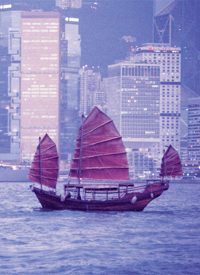
Malaya and Indonesia, for example, are lands in which a large percentage of the income and wealth is in the hands of ethnic Chinese immigrants. Hong Kong, long before Britain left when its 99-year lease expired, had among the highest standards of living in the Eastern Hemisphere. Singapore, too, far outstrips most other lands in Southeast Asia.
Chinese-Americans have also proven to be extremely capable professionals and entrepreneurs, starting from the very bottom of the socio-economic scale — lacking not only English language skills and a phonetic script, but a background in the Judeo-Christian religious traditions.
Considering all that, the proper question for China today is why is it still so relatively poor, and why did it not explode economically as did Japan after World War II? Why is the per-capita income in Taiwan, which was long a backwater in the old Republic of China, almost 500 percent higher than that on the mainland? If China had developed economically as Taiwan did after World War II, then it would not be nudging toward the lead among nations but would rather have a gross domestic product equal to the rest of the world combined.
Many patriotic and religiously serious Americans understood that fact. When John Birch brought the gospel to the Chinese people along with a sense of the goodness of America, he was reaching those eager for the message of freedom. And when in 1989, students in Beijing created a Goddess of Liberty, which looked exactly like our Statute of Liberty, these brave young Chinese knew just what they were seeking.
Now, we are instructed by the Chinese government and collectivist apologists in America, China is entering into its period of greatness. Or, perhaps, it is not. During the horrific years of Mao, perhaps the most diabolical mass murderer in history, there was a parallel to the Iron Curtain across Europe, which kept "happy" East Germans, Czechs, and Hungarians from leaving the workers’ paradise and seeking the capitalist empires. This was called the Bamboo Curtain. Daily for many decades Chinese risked their lives in large numbers seeking refuge in Hong Kong or Macao (a Portuguese colony near Hong Kong).
Fierce punishments awaited them and their families if they tried and failed, and even if they succeeded, these Chinese would begin at the very bottom of the unregulated Hong Kong economy. Today, there are millionaires in Communist China. One man, Su, builds skyscrapers in Beijing. He has no economic worries, as long as he plays along with the communist leaders, but nevertheless his fondest wish is to leave China.
"In China,” Su explains, “nothing belongs to you. Like buying a house. You buy it but it will belong to the country 70 years later. But abroad, if you buy a house, it belongs to you forever. Both businessmen and government officials are like this. They worry about the security of their assets." So Su, whose real name is secret for his protection, wants to go to America.
Although he can afford any luxury now and can travel to resorts, he wants more than that: freedom. It is not just economic freedom Su wants. The “one-child” policy denies him that most basic of human rights, the right to procreate. Family was long the center of Chinese culture and society. Large families were considered a blessing and children were cherished.
Su is not alone. Many of China’s new rich want to leave and to build a new life in freedom. Last year 68,000 Chinese gained permanent resident status in America, and large numbers also sought to live permanently in Canada and Australia. The tide of those who can leave China seems massive. There are an estimated 20,000 Chinese who have 100 million yuan, or about $15 million, in investments and an estimated 27 percent of these have already left China while 47 percent are considering it, according to China Merchants Bank and U.S. consultants Bain & Company.
Communism, even dressed up and presiding over a society that is more prosperous than under Mao, still repels the human spirit. The crackdown on “house churches,” which exist outside the official state-sanctioned Christianity of the communist regime, is more evidence of the desire of Chinese not to live under soulless communism.
Ironically, it was Lenin who coined the phrase which has haunted communist regimes ever since the Russian Civil War. Those who choose to leave China — either those from 40 years ago in a long, dangerous nighttime swim to Macao, or today’s successful Chinese who live at the top of China’s economy — are all doing the same thing: "voting with their feet."



